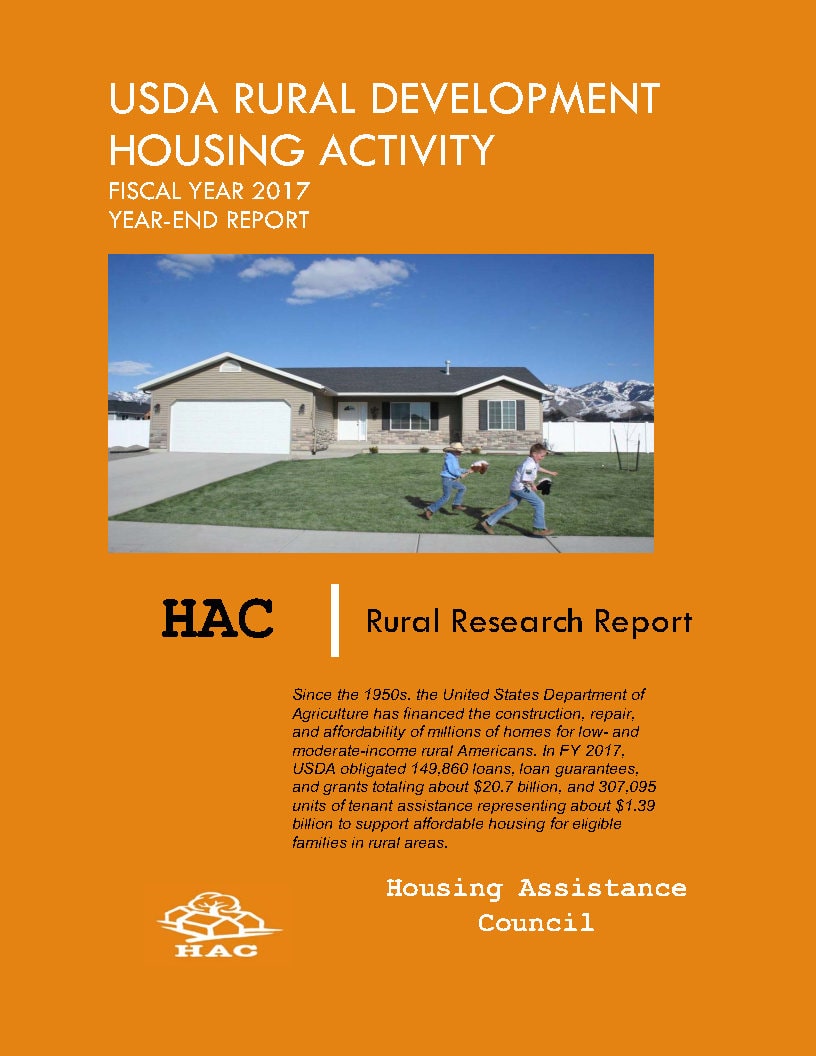HAC News: July 5, 2018
HAC News Formats. pdf
July 5, 2018
Vol. 47, No. 14
HAC seeks workshop proposals for the 2018 Rural Housing Conference • Nominate local and national leaders for HAC awards • HAC offers grants to affordable housing projects serving rural veterans. • Farmworker housing loans and grants available from USDA. • HHS will make grants for new Rural Communities Opioid Response Program • Judge extends FEMA housing aid in Puerto Rico to July 23 • Carson questioned about moving RHS programs to HUD • KIDS COUNT data book warns of Census undercount, shows mixed progress on well-being • Housing aid could reduce child poverty almost 21%, says Children’s Defense Fund • Housing a key in rural economies, members of Congress report • Senate passes Farm Bill • USDA posts webinar trainings for Section 502 direct program • Webinars offer information to engage low-income renters in elections
HAC News Formats. pdf
July 5, 2018
Vol. 47, No. 14
HAC seeks workshop proposals for the 2018 Rural Housing Conference.
HAC is looking to our constituents and partners for proposals for workshop sessions that engage participants and facilitate an active exchange of approaches and ideas to improve housing conditions in rural America. Check the online call for proposals and submit online by July 11. For more information, contact Mike Feinberg, 202-842-8600, or Kelly Cooney, 678-649-3831.
Nominate local and national leaders for HAC awards.
HAC is now accepting nominations for its 2018 Cochran/Collings National Service and Skip Jason Community Service Leadership Awards. Nominations are due Friday July 13. The awards will be presented at the 2018 HAC Rural Housing Conference in December. Past awardees are listed on HAC’s site. Complete the online nomination form. For more information, contact Lilla Sutton, HAC, 202-842-8600.
HAC offers grants to affordable housing projects serving rural veterans.
These grants, supported by The Home Depot Foundation, will go to nonprofits, tribally designated housing entities, and housing authorities serving veterans at or below 80% of area median income in rural areas. Projects may be new construction or rehab, temporary or permanent housing, in progress or beginning within 12 months. Applications are due July 9. For more details, contact Shonterria Charleston or Anselmo Telles, HAC.
Farmworker housing loans and grants available from USDA.
Pre-applications are due August 27 for USDA’s Section 514 Farm Labor Housing loans and Section 516 FLH grants for the construction or purchase and substantial rehabilitation of off-farm rental units and related facilities for domestic farmworkers. For more information, contact Mirna Reyes-Bible, USDA, 202-720-1753.
HHS will make grants for new Rural Communities Opioid Response Program.
The Federal Office of Rural Health Policy in the Department of Health and Human Services offers one-year planning grants to nonprofits, for-profits, tribes, and tribal organizations to form consortia and plan for treatment and prevention of substance use disorders, including opioid use disorder, in high-risk rural counties. Applications are due July 30. Contact Allison Hutchings, HHS, 301-945-9819. Nonprofit and tribal entities are also eligible to apply by August 10 for a grant to provide technical assistance to new or existing consortia. Contact Michael McNeely, HHS, 301-443-5812.
Judge extends FEMA housing aid in Puerto Rico to July 23.
A federal judge has ordered FEMA’s Temporary Shelter Assistance program to continue paying hotels through July 23 to house more than 950 Puerto Ricans evacuated after Hurricane Maria. Aid was set to terminate on June 30, but LatinoJustice PRLDEF and others sued because many homes remain uninhabitable. The short-term extension will cover shelter while the litigation continues.
Carson questioned about moving RHS programs to HUD.
At a House Financial Services Committee HUD oversight hearing on June 27, Rep. Frank Lucas (R-OK) asked HUD Secretary Ben Carson about the Administration’s proposal to move some of USDA’s rural housing programs to HUD. He asked why HUD is better equipped than USDA to meet rural housing needs. Carson responded that moving programs would not be “a very difficult shift” because HUD already has more activity in rural places than USDA’s rural housing programs. He said the change would reduce duplication and increase efficiency to help address the nation’s “severe fiscal crisis.”
KIDS COUNT data book warns of Census undercount, shows mixed progress on well-being.
The Annie E. Casey Foundation’s yearly report measures child well-being nationwide and in each state. This year it estimates about 1 million children under age five could be left out of the 2020 Census count and warns of “troubling consequences” because Census data determine the allocation of much federal assistance. The research shows upward trends in economic indicators of child well-being, but mixed results or stalled progress in education, health, and family and community indicators.
Housing aid could reduce child poverty almost 21%, says Children’s Defense Fund.
CDF’s Ending Child Poverty Now report states that without federal safety net programs child poverty would be 68% higher. Even so, more than one in five American children is poor and the rate is three times higher for African-American children. Investing another 2% of the national budget and making other changes would reduce child poverty by 60% and improve economic circumstances for the families of almost all poor children. Currently only one in four eligible families with children receives federal housing aid, but making it available to all who are eligible would alone reduce child poverty nearly 21%.
Housing a key in rural economies, members of Congress report.
Investing in Rural America: Bringing Progress and Economic Opportunity to Rural Communities, released by Democratic members of the Congressional Joint Economic Committee, covers housing, education, health care, infrastructure, and more. The housing chapter notes challenges related to substandard housing, Indian Country’s unique situation, fewer rental options, limited access to mortgage credit, and loss of federal aid as rental housing mortgages mature. Its recommendations include empowering nonprofit organizations.
Senate passes Farm Bill.
The full Senate passed its version of the 2018 Farm Bill, S. 3042, on June 28, without the controversial work requirements for food stamp recipients that are included in H.R. 2, the House bill. The Senate accepted two amendments offered by Sen. Heidi Heitkamp (D-ND); one of them establishes a technical assistance program to improve tribal access to USDA rural development programs, including housing, and another that creates Tribal Promise Zones. Next, a conference committee will need to resolve differences between the two bills.
USDA posts webinar trainings for Section 502 direct program.
Webinars on income calculations, credit requirements, and intermediaries have been posted along with other resources on USDA’s website (select the Forms and Resources link).
Webinars offer information to engage low-income renters in elections.
A series of six webinars beginning July 17 will provide strategies for nonpartisan voter registration, candidate engagement, and voter education. The series is sponsored by the National Low Income Housing Coalition’s Our Homes, Our Votes campaign.
SAVE THE DATE FOR THE 2018 HAC RURAL HOUSING CONFERENCE!
The conference will be held December 4-7 at the Capital Hilton in Washington, DC. The HAC News will announce when conference registration opens and when the hotel room block is available for reservations.
NEED CAPITAL FOR YOUR AFFORDABLE HOUSING PROJECT?
HAC’s loan funds provide low interest rate loans to support single- and multifamily affordable housing projects for low-income rural residents throughout the U.S. and territories. Capital is available for all types of affordable and mixed-income housing projects, including preservation, farmworker, senior, and veteran housing. HAC loan funds can be used for pre-development, site acquisition, site development, and construction/rehabilitation. Contact HAC’s loan fund staff at hacloanfund@ruralhome.org, 202-842-8600.
Please note: HAC is not able to offer loans to individuals or families. Borrowers must be nonprofit or for-profit organizations or government entities (including tribes).


